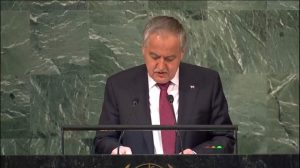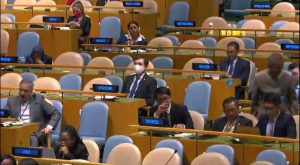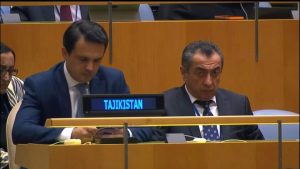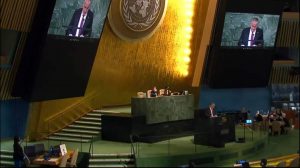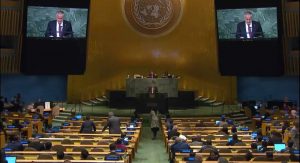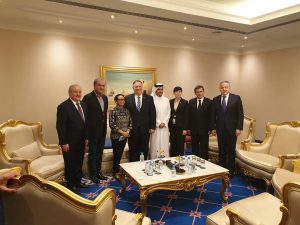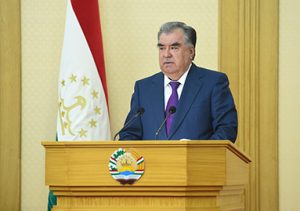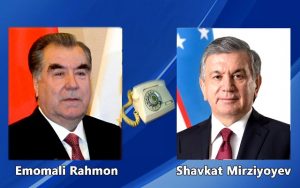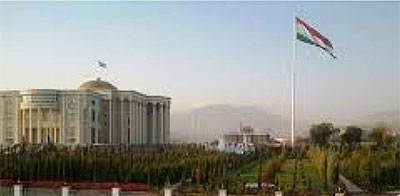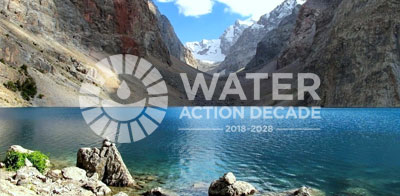Statement of the Tajik Foreign Minister H.E. Mr Sirojiddin Muhriddin at the General Debates of the 77th Session of the United Nations General Assembly
Distinguished Mr. President,
Distinguished Mr. Secretary-General,
Excellencies,
Ladies and Gentleman,
Let me join previous speakers in extending our congratulations to you, Ambassador Csaba Kőrösi, on your election as President of the United Nations General Assembly at its 77th Session.
I wish to take this opportunity to pay a befitting tribute to your predecessor, His Excellency Abdulla Shahid, for his effective guidance and excellent leadership during the most challenging and uneasy times for the entire humanity.
Excellencies,
Our world is going through turbulent times.
We are witnessing the transformation of the existing world order.
Threats such as terrorism, extremism, drug and arms trafficking, cybercrime and other forms of cross-border organized crime have a tendency to increase exponentially.
To further discuss the abovementioned issues, the Government of Tajikistan, the United Nations Office of Counter-Terrorism (UNOCT) and its partners will be holding a High-Level International Conference on «International and Regional Border Security and Management Cooperation to Counter Terrorism and Prevent the Movement of Terrorists» in Dushanbe, Tajikistan on 18-19 October 2022. We invite you to attend this important Conference.
Climate change, natural disasters, food insecurity, ongoing impact of the pandemic, among other things, further add fuel to the fire.
The international community needs tools that are fit for today’s rapidly deteriorating environment. Mechanisms that were established decades ago are now finding it difficult to cope with the emerging challenges.
The world needs more robust multilateralism to tackle the toughest challenges, with the United Nations at the helm.
Therefore, Tajikistan supports the efforts of the U.N. Secretary-General aimed at comprehensive reform of the organization to strengthen its capacity to timely and adequately respond to the development needs and efficiently address contemporary threats.
There is a historic opportunity to steer change in a direction beneficial for all humanity. It shouldn’t be wasted.
Mr. President,
Allow me to address three additional topics which are very important for my delegation: implementation of our roadmap – 2030 Agenda, water, and climate change, as well as peace and security.
Tajikistan strongly reaffirms its commitments to the full implementation of the 2030 Agenda and its Sustainable development goals.
As we are lagging behind on many SDGs, the Government of Tajikistan has taken bold steps toward integrating SDGs into national policies and development plans. Despite substantial progress made towards the achievement of SDGs, there are significant risks, such as climate-related hazards and disasters that could slow or reverse Tajikistan’s path towards the realization of 2030 Agenda and threaten agricultural productivity and food security.
Mr. President,
This year the world has witnessed unprecedented water-related natural disasters.
While we all have been struggling with the consequences of these water-related disasters, we are becoming increasingly aware that water is vital and a resource we must value, protect, and manage effectively.
We need actions that can make a real difference.
On 6-9 June 2022, we successfully held the Second Dushanbe Conference in Tajikistan, which became a key preparatory meeting for the midterm review of the Water Decade in 2023.
As you are aware, on 22-24 March 2023, the U.N. will convene its second water conference after 46 years.
The U.N. 2023 Water Conference will be a good opportunity for all of us to review and evaluate the progress made and the gaps and obstacles we have encountered in realizing the goals of the Water Decade.
Tajikistan and the Netherlands, leading the preparations for this global event, are diligently working and are determined to make the Conference a watershed moment for the whole world.
To this end, we launched the Water Action Agenda as one of the outcomes of the UN 2023 Water Conference. We expect and encourage everyone to come to the Conference with new commitments to enrich the Water Action Agenda.
This is important and necessary not only for us today, but for our children, our future generation!
Mr. President,
The impact of climate change on water resources is another crucial topic that requires our concerted efforts. Alongside the increase in mudflows and floods, water scarcities and droughts, and changes in the hydrological cycle, today, the accelerated melting of glaciers, the primary sources of fresh water on the planet, is of great concern.
To this end, Tajikistan is actively promoting an integrated approach to addressing water and climate issues, including within Water and Climate Coalition. During the Coalition’s first meeting, H.E. Emomali Rahmon, President of the Republic of Tajikistan, proposed declaring 2025 as an international year of Glaciers’ Preservation. We are currently working on the draft resolution to advance the said initiative through the second committee of the U.N. General Assembly. We seek your constructive engagement and support for this important resolution.
Mr. President,
Response to the ever-increasing threat of terrorism and extremism should be comprehensive, with the U.N. as a key coordinator.
For its part, Tajikistan has undertaken several measures in this direction. We have, among other things, adopted our «National Strategy and Action Plan of the Republic of Tajikistan on Countering Terrorism and Extremism for 2021-2025″ and expressed our readiness.
Tajikistan strongly believes that small states should also have a greater chance to contribute to finding solutions for maintaining peace and security.
Hence, following years of contributions to multilateralism through active participation in the United Nations activities and processes and having unique peacemaking experience and insightful knowledge about Afghanistan, the time has come for Tajikistan to seek for the first time, its non-permanent seat on the U.N. Security Council for 2028-2029.
We are looking forward to closely working with all the U.N. member states to gain the trust and support for this vital campaign.
Mr. President,
Tajikistan, a peace-loving country that went through a devastating imposed Civil War, is very aware of its cost and long-lasting consequences.
Therefore, we can’t stay indifferent to the fate of our immediate neighbors– the noble people of Afghanistan, who have suffered enough for the past 40 years. They deserve peace and tranquility.
Exactly one year ago, in this very same room, the President of Tajikistan, H.E. Mr. Emomali Rahmon, in his virtual message before the United Nations General Assembly, dedicated more than half of his statement to the situation in Afghanistan.
His concerns and warnings, unfortunately, fell on deaf ears.
One year after the fall of Afghanistan:
No inclusive government has been formed despite repeated calls from Afghans, regional countries and the international community for greater ethnic, political and geographical diversity in the de facto administrative structures.
The country is on the verge of humanitarian and economic catastrophe. To ease the suffering of the Afghan people during these difficult times, Tajikistan has provided its infrastructure, territory, and communication means to all stakeholders and donor countries to deliver humanitarian assistance directly to the people of Afghanistan. We have also never stopped providing the people of Afghanistan with muchneeded electricity since the Taliban came to power;
The environment of intimidation and a deterioration in respect for human rights, including the rights of women and girls, is overwhelming.
Diverging opinions and existing internal contradictions within the Taliban and the emergence of additional armed opposition groups, including ISILK and other terrorist groups, make the security situation in the country even more fragile. Furthermore, Taliban’s inability to control its militants and other terrorist groups further complicates the already difficult situation. The recent discovery and killing of one of Al-Qaeda’s top strategic minds in Kabul is a vivid testimony of those ties;
Afghanistan is rapidly becoming a safe haven for terrorist groups and a springboard for spreading the Taliban’s radical extremism. In addition, we are witnessing systematic work on transferring militant groups consisting of former nationals of Central Asia to the north of Afghanistan aimed at consolidating and creating a new hotbed of tensions near our borders.
Unfortunately, the implications for Tajikistan, which shares 1400 km of border with this country, are enormous.
In the current alarming situation, it is paramount for Tajikistan to strengthen its border with Afghanistan and create the necessary border infrastructure along its entire length.
At the same time, we believe that the participation of Afghanistan in the process of multifaceted regional cooperation is a key to the success of the efforts undertaken by the international community.
Mr. President,
On 20th September 2022, the leadership of the Kyrgyz Republic, delivered his speech from this high rostrum, talked about Kyrgyz version of the conflict on the Tajik-Kyrgyz border.
Its regrettable that the issues of settlement of the state border line between Tajikistan and Kyrgyzstan, which we inherited from history, are groundlessly raised at the UN General Assembly.
I believe it is important to inform you that on September 19th, 2022, the authorized representatives of the two sides signed the Protocol on the settlement of the situation at the border. All hostilities have ceased.
The troops and military equipment of both sides must be withdrawn to their places of permanent deployment. A joint inspection was organized in the border area. A joint task force has been set up to monitor the implementation of the agreements reached. Most importantly, both parties reaffirmed their commitment to resolving all bilateral issues exclusively by political and diplomatic means. Tajikistan has followed and will always follow this principle when any issues arise, including the settlement of the situation on the border.
It is with deep regret that Kyrgyzstan is deviating from the agreements reached, creating a false appearance of withdrawing troops and heavy military equipment from the line of contact by hiding them in populated areas near the border. Therefore, the responsibility for any next round of tension on the Tajik-Kyrgyz border will lie exclusively with Kyrgyzstan.
The leadership of the neighboring country, in their speech, mentioned the death of their citizens and financial damage, creating the false impression that the tragedy on the border affected them exclusively. The evidences say otherwise. As a result of military aggression of Kyrgyzstan, more than forty civilians of Tajikistan were killed and about two hundred were injured. The casualties include pregnant women, children, elderlies, doctors, as well as devout Muslims — attendants of the mourning ceremony in the mosque.
In addition to border facilities, schools, hospitals, religious buildings, residential buildings, infrastructure and utilities were destroyed. So, who is the aggressor here?
Tajikistan is currently channeling significant resources to rebuilding destroyed houses and vital infrastructure.
The tragedy that happened in the border area is not accidental. Since the last autumn our neighbors have been preparing for aggression, which manifested itself in the creation of military infrastructure near our borders.
In recent years, our neighbors have often spoken, including from this high rostrum, about the importance of an international transport artery and the creation of favorable conditions for transportation, while advocating “the removal of barriers to economic cooperation, the simplification of procedures for passing borders and transit between countries and regions.» At the same time, Kyrgyzstan often creates problems for the transit of goods to / from Tajikistan, delaying vehicles with thousands of tons of our cargo.
Mr. President,
It’s important to note that we managed to successfully resolve the border issue with China and Uzbekistan, and this is an achievement of a lengthy process for all parties.
We have accumulated enough experience, which is important to use in its entirety when resolving border issues on the basis of mutual respect, trust and openness.
Over the twenty-year history of negotiations with Kyrgyzstan, we have signed dozens of protocols. However, as time passes with the change of political groups in power, they continuously revisit these documents and implement only those provisions that are in favor of them exclusively, while ignoring the other provisions.
As of today, both countries managed to agree on and develop a draft description of about six hundred and two kilometers of our joint border, which is approximately sixty-one percent of its total length.
Tajikistan, relying on the international practice of border delimitation, has repeatedly offered its neighbors to record the results of this many years of work on paper, by signing an agreement on separate sections of the border. But our neighbors strictly decline this proposal.
The leadership of Kyrgyzstan mentioned in this high rostrum the Agreement on the Establishment of the Commonwealth of Independent States and the Alma-Ata Declaration, presenting them as a legal framework for determining the state border.
However, I have to emphasize that the issue of determining the border line is not the subject of regulation of these documents. To our deep regret, relying on its unilateral approach, since 1950s, Kyrgyzstan has arbitrarily seized more than two thousand one hundred and ten (2110) square kilometers that rightfully belong to Tajikistan. Our neighbors didn’t mention anything about it either.
I would like to inform the General Assembly that Tajikistan and Kyrgyzstan have reached an agreement on the description of the state border line according to the documents of the national-territorial delimitation of 1924-1927.
It is these documents that have gone through all the constitutional procedures and, accordingly, are the only legal framework for continuing the negotiation process. Despite this, in order to show goodwill and maximum flexibility, we met our neighbor halfway and agreed to also use the documents of the 1989 parity commission proposed by Kyrgyzstan.
Border issues are not resolved by the populist statements and the creation of crisis situations. We need daily, thoughtful, joint work based on the political will of the parties.
We stand ready to continue negotiations and firmly believe that the Tajik and Kyrgyz peoples have the right to live and build together an atmosphere of peace, friendship and harmony.
Tajikistan, having survived the horrors of internal conflict, understands the value of peace, and will make all its efforts to ensure that security and stability reign in our region.
I thank you for your attention!
